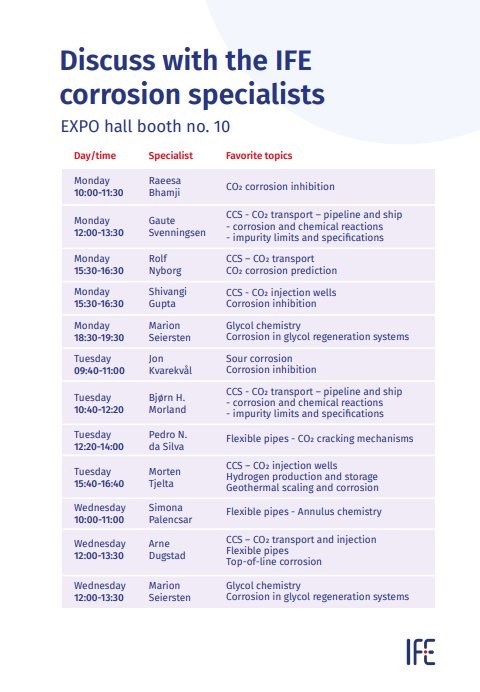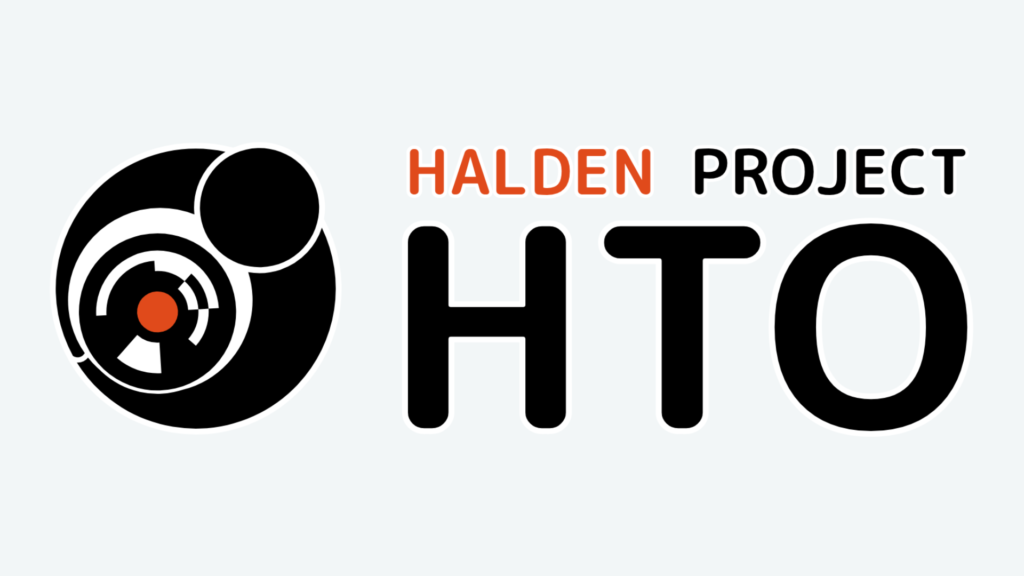European Corrosion Congress
07 – 11 September 2025
The European Federation of Corrosion (EFC) is a leading organization dedicated to advancing the science and engineering of corrosion prevention and control across Europe and beyond. Each year, EFC hosts the EUROCORR conference, the largest European event for corrosion professionals, bringing together researchers, industry experts and students to share the latest developments, innovations, and best practices in corrosion science and technology.
The Institute for Energy Technology (IFE) is proud to serve as organizer, sponsor, exhibitor and scientific contributor to EUROCORR 2025 in Stavanger, a city with strong ties to the energy and maritime sectors. As a leading research institute with deep expertise in corrosion science, materials technology, and energy systems, IFE will contribute to this year’s conference through technical presentations, chairman duties and industry engagement.
Meet our attendees

Simona Palencsár
Research Scientist (MSc), has worked in the Corrosion Technology Department since 2012, focusing on CO₂ corrosion in the oil and gas industry. Her main research area is corrosion and fatigue in flexible pipes.
H2S consumption in gas filled annuluses of unbonded flexible pipes
Place: Lysefjorden B, monday 17.30

Raeesa Bhamji
Corrosion Researcher (PhD), specializes in carbon steel degradation in CO₂-rich environments. She is proficient in electrochemical techniques, particularly Electrochemical Impedance Spectroscopy (EIS), and currently investigates corrosion mechanisms in low-pressure carbon capture systems.
Electrochemical Investigation on Inhibition of Deep Pit-Like Features Under Inert Deposit Layers in Aqueous CO2 Environments
Place: Lysefjorden B, tuesday 14.20

Gaute Svenningsen
Principal Scientist (PhD), is a corrosion and materials expert with extensive experience in CO₂ and H₂S corrosion of carbon steel, including liquid and supercritical CO₂ systems for CCS. His work includes top-of-line corrosion evaluation, chemical modeling (MultiScale), and corrosion in flexible pipelines. He also specializes in microscopy and material characterization using SEM and EDS.
Recap of research on reactions and corrosion in CCS streams, Lysefjorden B, tuesday 16.30
Corrosion and chemical reactions of CO₂ with impurities, Snønuten, thursday 10.40

Arne Dugstad
Chief Scientist. Main research areas are dense phase CO2 transport (CSS), corrosion in liquid and super critical CO2, corrosion in flexible pipelines, CO2 and H2S corrosion in oil and gas systems, and MEG regeneration and salt accumulation.
Dugstad received the NACE fellow award in 2002.
CO2 transport-when becomes corrosion an issue
Place: Mastrafjorden, wednesday 9.30

Morten Tjelta
PhD in (photo)electrochemistry from NTNU. Since 2013, he has worked at IFE as a research scientist in the corrosion department, focusing on corrosion and scaling in industries such as oil & gas, geothermal energy, and CO₂ transport. His expertise includes H₂S corrosion, alkaline water electrolyzers, and injection wells.
Corrosion of CRAs in simulated
CO2 injection wells
Place: Snønuten, wednesday 15:20

Pedro Netto da Silva
Research Scientist (DSc), is a metallurgical engineer with expertise in CO₂-induced corrosion of carbon steel, particularly stress corrosion cracking (SCC) in armour wires of flexible pipes. He has experience in corrosion-fatigue testing, high-temperature materials in nitriding environments, and advanced characterization techniques including SEM, EDS, XRD, and electrochemical methods.
Influence of Surface Finish on the CO₂ Corrosion of a High Strength Carbon Steel
Place: Snønuten, wednesday 16.30

Bjørn H. Morland
Senior Scientist (PhD), specializes in CO₂ transport for CCS, with expertise in corrosion and CO₂ specification across gaseous, liquid, and supercritical phases.
Corrosion in CO2 acid saturated conditions
Place: Snønuten, thursday 10.00

Shivangi Gupta
Expert in corrosion, with a focus on CCS and the oil & gas industry. Specialized in corrosion in liquid and supercritical CO₂ systems, particularly in carbon steels under injection well conditions. Active in CCS research since 2022.
Impact of acid dropout on corrosion in dense phase CO2 systems
Place: Snønuten, thursday 11.50

Marion Seiersten
Research Scientist, specializes in glycol regeneration and reclamation, with a focus on solids precipitation, scaling, and impurity-driven degradation in glycol systems. Their work also explores the use of glycol as a carrier for corrosion inhibitors. Contact Point for Glycol

Rolf Nyborg
With over 30 years of experience, he specializes in CO₂ and H₂S corrosion in oil and gas pipelines and CCS systems. He has led several major international joint industry projects involving up to 15 oil companies, focusing on localized corrosion, model development, and evaluation.
Local Organising Committee member



